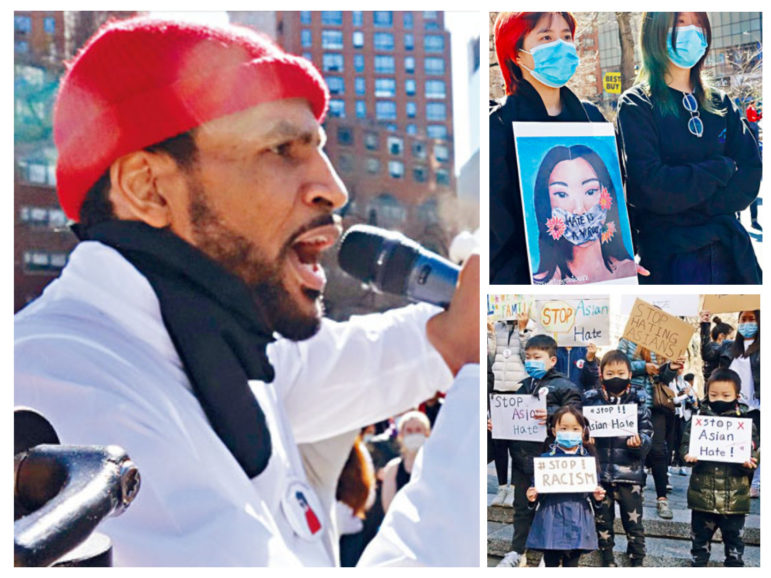The Union Square rally was organized to form solidarity between the two communities, which share similar sufferings but have had a complex relationship that presented itself clearly at the event, according to Sing Tao Daily.

Photos courtesy of Sing Tao Daily
Nearly a thousand people rallied in Union Square Sunday at an anti-hate rally organized by Asian and Black activists.This story was originally published by Sing Tao Daily on March 22, and has been slightly condensed. Translated by Rong Xiaoqing.
A rally against anti-Asian hate crimes drew close to a thousand people to Union Square on Sunday. Among the many protests held in response to the shootings in Atlanta that caused eight deaths, including those of six Asian women, this one was jointly organized by young Black and Asian activists to form solidarity between the two communities, which share similar sufferings but have had a complex relationship that presented itself clearly at the rally.
The balmy weather helped draw a huge crowd of participants from all racial groups, with Black and Asian attendees making up the majority. Signs with words like “Say no to anti-Asian hate” and “Hate is the virus” were ubiquitous, and many held boards on which “Asian lives matter” and “Black lives matter” were written side by side.
Speakers from both communities emphasized that racism and white supremacism are their common enemies. One of the organizers of the event, a Black actor and screenwriter who goes by the name COFFEY, led the crowd to chant together in rhythm: “Asian lives matter. Black lives matter. Your life matters. Our lives matter.”
“A lot of people don’t believe in coming together. The first thing they do is the label out Blacks, and Asians too, as criminals. When [a] white supremist did this, they say he has a mental illness. Hell no!” said COFFEY. “We want you guys to live because we want to live. That’s why we are here.”
Power Malu, an organizer and partner of Running to Protest, called for participants to stay together to keep fighting against stereotypes, even when the media attention wanes. He quoted Grace Lee Boggs, the Chinese American civil rights leader who married Black activist James Boggs and fought for equal rights for Black people until she passed away in 2015. “The time has come to grow our souls, to grow our relationships with one another, to create families that are loving and communities that are loving, to bring the neighbor back into the hood,” Malu quoted.
In a candid and powerful speech, Dao-Yi Chow, a Chinese American designer and one of the organizers of the rally, directly addressed anti-Black racism in the Asian community. “The institutions that led to the murders highlighted by the BLM movement are the same that led to the shootings in Atlanta,” said Chow.
“We have to recognize our own anti-Black racism for decades,” Chow added. “We cannot be safe until everybody is safe.”
The speeches received roaring cheers and reactions. Yuyi Jin, president of the Association of Guizhou, a township organization for Chinese from Guizhou province, said Black Americans have richer experience in civil rights protests and that the Black Lives Matter movement has offered a demonstration for Asian activists to follow. “The most important thing is not the conflicts between different communities but the challenges of living in the U.S. for all,” Jin said.
To Jie Li and Hang Chen, app-based taxi drivers from Fujian Province, anti-Black racism exists in the Chinese community but is not widespread. But they did notice that the Chinese community didn’t stand up in large numbers during the BLM protests last year, either. “That’s because the protests then were accompanied by some riots, and many Chinese didn’t want to be seen as they were supporting violence,” said Chen. Both vowed to support causes of the Black community more often. (City Limits’ note: While there were serious incidents of violence in a few areas of the city during last summer’s protests, the majority of protests were peaceful).
But not everyone feels the chasm between the two communities will disappear overnight. “I have never seen a real solidarity. It’s always that Black people lay the ground and others come to grab the spotlight,” said Darryal Dashiell, who is Black and works in the movie and TV industry. “Asians have achieved success in this country. What I’ve seen more often is that Asians open shops in the Black neighborhoods and treat Black customers badly. If these protests can help us to put aside our differences and focus on our common interest, it’s going to be great. But I cannot see the hope now.”










2 thoughts on “In Wake of Atlanta Shooting, Black and Asian New Yorkers Rally Together Against Hate”
Except that in NYC most attacks on Asian-Americans are committed by African-Americans.
Asians are being attacked by blacks simply because they are easier targets with a smaller frame. As we can see many victims were women and elderly asians. The media hides the fact it’s mostly black men doing this. The disgusting media and politicians. They are the ones who are engineering the hate and keeping it alive. Because naming the perpetrators hurts their black-victim narrative.